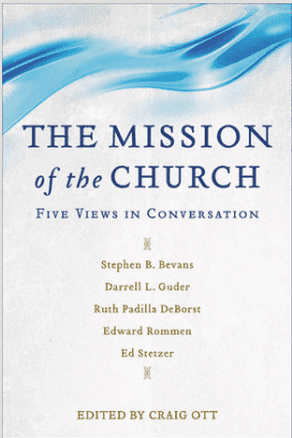posts
 The Mission of the Church is a timely book on an often-debated issue—the meaning of Christian mission. Trinity Evangelical Divinity School church planting professor, Craig Ott, has invited an excellent team of diverse scholars to engage the question. In a robust introduction, Ott situates the discussion within twentieth-century global Christian history and he provides a helpful backstory on a variety of Christian perspectives on mission (Roman Catholic, Eastern Orthodox, mainline Protestant, fundamentalist, and evangelical). The presenters and perspectives represented include: (1) Stephen Bevans, a Roman Catholic missiologist who defines mission as “prophetic dialogue.” (2) Mainline Protestant scholar Darrell Guder who proposes a “multicultural, translational” approach. (3) Latin American evangelical Ruth Padilla-DeBorst who presents mission as “integral transformation.” Padilla-DeBorst is the only female and non-North American contributor in the book. (4) Edward Rommen, a former evangelical and now Orthodox priest, offers the Orthodox perspective or what he terms a “sacramental vision” approach. (5) Ed Stetzer, an evangelical, proposes an “Evangelical Kingdom Community Approach.” Following these perspectives chapters, each author responded briefly to the other essays. Unlike other counterpoint books, this book shaped up to be more of a constructive dialogue with significant consensus on points such as the Trinitarian foundation of mission, the missio Dei as the starting point for missions, and that mission is church- and Christ-centered. Bevans makes a compelling case for mission as a prophetic dialogue. On one hand a dialogue implies relationship, hospitality, trust and meeting people where they are. On the other, it involves denouncing injustice and calling those far from God to repent. When I read this, I was reminded of Andrew Walls’ assertion that the gospel ought to be “at home” and “pilgrim” in every culture. While I generally affirm his thoughts, I’m a bit puzzled that Bevans includes ecumenical dialogue within the practice of mission (p. 12). Mission in my view involves crossing the barriers from faith to non-faith; so I struggle to see how encounters and discussions between professing Christ followers counts as mission. Guder, already known for his influential work, The Missional Church, builds his excellent argument on a Nicene (one holy catholic church) understanding of the church. His missional ecclesiology includes the church’s catholicity, apostolicity, and unity. Citing David Bosch, Guder affirms that “mission . . . is seen as a movement from God to the world; the church is viewed as an instrument for God’s mission” (p. 22). In her essay, Padilla DeBorst largely revisits the holistic missiology of the Latin American Theological Fellowship, which was pioneered by her father, Rene Padilla, among others. I admire Padilla DeBorst’s continued commitment to reflect on missional theology in the Latin American context, one that has been marked by oppression, poverty, and great social needs. She is no armchair theologian! I also affirm that mission is both in word (proclaiming the gospel and making disciples) and deed (caring for real humans needs and confronting injustice); however, unlike Padilla DeBorst and the FTL, I see gospel proclamation as the central and ultimate aspect of Christian mission. For Rommen, the church and the Eucharist are central to mission theology. Although I do not hold to Rommen’s theology of the Eucharist, I do agree with his argument that worship (liturgy) is the point of departure and arrival for mission. Witness and service are the “liturgy after the liturgy” (p. 69). The Lord’s Supper is also an excellent dramatic retelling of the death, burial, and resurrection of Christ and, in my own experience, a wonderful evangelistic opportunity to invite non-believers to see the gospel. Of course, as friends believe, we would invite them to become a worshipper and partaker of the Lord’s Table. I also agree with Rommen that the gospel is not about information but about a person. We do not commend an ideology; we commend Christ. I find his critique of evangelicals on this point to be unwarranted. In fact, the weakest parts of Rommen’s essay are his overstated critiques against evangelicals (and his own past). I most resonated with Stetzer’s essay. For me, his biggest contribution was showing a good grasp of history and sketching out his mission theology in light of the last century of mission theology. He also affirms that mission is in word and deed but maintains the centrality of proclamation (the evangelical values of crucicentrism and conversion) in mission. In sum, this is a really good book and a good model for winsome, constructive dialogue. As the editor acknowledges, it would have been strengthened by more diverse voices from the global church. I recommend this book for introductory courses in biblical theology of mission. Comments are closed.
|
Archives
November 2023
|
 RSS Feed
RSS Feed
